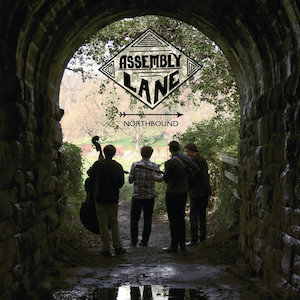 Assembly Lane: Northbound
Assembly Lane: Northbound
Self Released – 10 November 2017
Assembly Lane are based in Newcastle where they all attended the University, which has a folk and traditional music degree and postgraduate research opportunities. Niles Krieger (fiddle, vocals) comes from Connecticut and landed in the UK in 2011. He was the first recipient of the Ewan MacColl Memorial Award, a postgraduate scholarship at Newcastle University. Matthew Ord (guitar and vocals) has spent time on the blues circuit but has a passion for Appalachian music – and a blog site about folk music and ballad studies. Tom Kimber (mandolin and vocals), a finalist in the BBC Young Folk Awards and Bevan Morris (bass and vocals) share their time with Pons Aelius, winners of the Danny Kylie Award at the 2015 Celtic Connections.
Together they all share a common interest in music from various traditions, on both sides of the Atlantic, bringing bluegrass, British folk and contemporary interpretations to a set of songs and tunes on this their debut album. Of the ten tracks on the album, six are traditional or at least have their genesis lost in time; three are written by Tom Kimber, and two of these are inspired, I can only guess, by the underground: Mind The Gap and Northbound.
I see from my initial notes that I wrote “nice little tune” about Mind The Gap. I have spent over half my life avoiding the word ‘nice’ since my late father-in-law banned it from his household (he was a headteacher if that is any sort of an excuse) yet here it has sneaked in through scribbled thoughts. And it is a nice little tune. Northbound has a different feel, more modern, the more pronounced bass giving a bluesy/jazzy overlay, possibly accentuated by a bit of a lazy swing. This runs directly into Fivefold, Kimber’s third tune, where the pace is picked up and the fiddle leads us to the Borders, inviting us to dance a reel.
The traditional tunes cover a wide spectrum and no doubt reflect the band’s musical backgrounds and interests. The first track, The Hills of Mexico, is a good introduction to the album. From the start, the band sound right and are very much together. This song was originally made famous by Appalachian folk musician Roscoe Holcomb and also featured on the Basement Tapes by Bob Dylan and The Band. Apparently, Dylan did not want the recording completed, but this Assembly Lane version is a good opener and was Song of the Day in September. The second track, which also appeared in a version of The Basement Tapes, Ain’t No More Cane, is a prisoner song originally from the late 19th century and collected by Alan Lomax.
Jump to the final three tracks and the exploration of the American tradition continues. 1845 is a song that has so many variations, including several different titles, that it must be difficult to keep up with. However, despite the availability of all these varieties, or even because of them, in an odd way the oral tradition is maintained. The Road to Columbus, from the pen of the father of American Bluegrass Bill Monroe, is a cracking tune that clearly the band enjoy playing. The final track is yet another example of the how titles vary. Don’t You Hear Jerusalem Mourn is a satirical song about the foibles of the various denominations – some may recall the version by the Nitty Gritty Dirt Band which went by the more common title Don’t You Hear Jerusalem Moan. Assembly Lane’s rendition does it justice by singing it straight, the gospel overtones emphasising the cutting commentary.
There are two songs from the British canon: The Fair Flower of Northumberland and Sir Patrick Spens. Both are well known and, like the American songs, both have many variations. This is the great thing about folk music. There is no right or wrong version, there are just versions. Personal taste is as much an influence on the performance of a song as much as anything else. Having said that, I have to confess that I find The Fair Flower of Northumberland quite a dreary song and have never found a version that has altered my view. In this version, Krieger’s fiddle does raise my interest, both in underlining the verses and decorating the spaces between, which has to be a good thing. Sir Patrick Spens is a great example of the band’s light touch approach to the music, concentrating on getting the message and the music in harmony.
As I said at the start, this is a band which are very much together. Their various backgrounds feed into the music they play and there is a real sense of feeding off each other. There is also a sense of ‘knowing’ the music – a hint of academic research perhaps? I am not sure how that manifests itself, perhaps through the version chosen, the arrangements made? The mix of tunes works well and the fact that they are from different places geographically and musically is a strength and shows how at home Assembly Lane are with bluegrass, traditional British folk or contemporary folk.
I have also mentioned the light touch – delicate yet robust – which is also true of the production values, where the tracks are not overdone in terms of arrangement or recording. Clearly, four very finely-tuned musicians and what they have brought to this album, individually and collectively, takes us another step on the way forward for traditional music.

